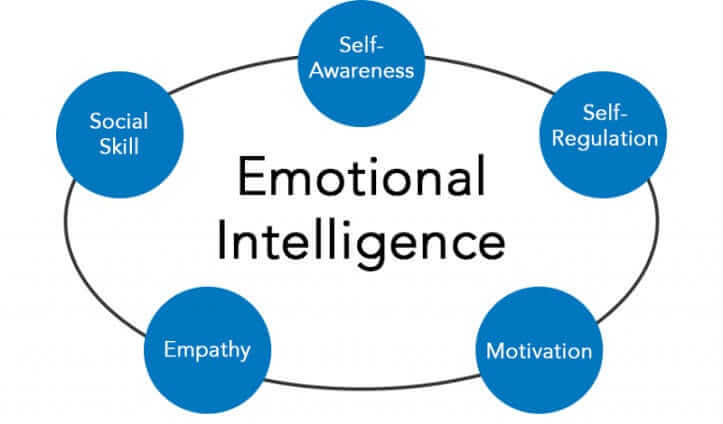If you can stay calm and collected when everyone else is stressed or angry, you’re showing signs of emotional intelligence. Similarly, when you can sense that a friend is feeling down, without him uttering a word, it is your emotional intelligence talking.

If you pause to think before reacting in a heated moment, you’re showing emotional control and self-awareness. Moreover, if you can talk about your feelings in a clear, respectful way or help two people solve a disagreement without taking sides, you’re using emotional intelligence to the fullest. Now that you know ‘WHAT’ it is, let’s jump to the discussion of ‘WHY’ you need it in life.
The Importance of Becoming Emotionally Intelligent
There is a night and day difference between an individual who is capable of handling his feelings along with those of others around him, and an individual who mentally se brain crashes in such a moment. One can hardly imagine how overwhelming and stressful it is for people with weaker interpersonal skills to handle the emotionally charged situation.
A victim describes it as:
“It feels like drowning in emotions you can’t control. My mind freezes, my heart races, and I can’t think clearly. Even small problems feel huge and impossible to handle.”

4 Pillars of Emotional Intelligence
If you are a student working on your CIPD assignments UK, this blog will be really informative and helpful for you. We say this because, even when you might not be able to notice the direct relation, having a high EQ can support your CIPD goals in manifold ways.
Once you master handling your feelings, you will be amazed to see how it will have improved your leadership, communication, and conflict resolution skills, preparing you for being the best people manager.
Coming back to the four pillars, before we reveal the names, know that each of them represents how you can understand and manage the sentiments: both personal and other people. Moreover, they will help you build stronger relationships with the people around you.
- Self-awareness
It involves an understanding of one’s own emotions, strengths, weaknesses, values, and motivations. It also includes recognizing how your emotions affect your thoughts and behavior.
- Self management
This pillar focuses on regulating one’s feelings and behaviors. It involves managing stress, controlling urges, adapting to change, and maintaining a positive outlook.
- Social awareness
Moving on, this is the ability to understand the reactions, needs, and concerns of others. Moreover, it is about exhibiting empathy and recognizing social cues.
- Relationship management
The last one refers to the ability to build and maintain strong relationships; it also talks about communicating effectively, inspiring, influencing, and resolving conflicts.
The Importance & Benefits of Being Emotionally Intelligent
Being sane enough to know what you and others are feeling is the simplest definition of EQ. But why is it important to have this knowledge? What improvement is this going to bring to your life? Here is the answer.
When you are self-aware and empathetic, your communication abilities enhance. For instance, the EQ allows you to clearly convey your message without any trouble. It lets you understand and make others understand what you are experiencing.
After that, you can build a deeper connection by understanding and responding to the emotions of others around you. In short, you are at peace, and others are able to trust you. Moreover, there are no more nasty arguments because they get replaced by calm and healthy discussions.
Next up, you, your friends, your family, everyone should strive for a higher emotional intelligence because it makes you a great leader. If you are a student attempting CIPD, and aim to join the HR forces, this is the best favor you can do to yourself, as with a high EQ, you will be more effective at motivating teams and handling tough situations by saying: Relax, I’ve got this.
However, not just this, you will be able to develop a positive work environment as assignment help offers, and also make informed decisions. On a similar note, it will help you to collaborate effectively and work in teams, bringing out outstanding results.
In addition, by managing stress and feelings effectively, you can be more productive, handle criticism, and bounce back from setbacks. Furthermore, this ability helps an individual in reducing their stress and anxiety.
Become a Person with a High EQ in 5 Proven Ways
- Self-Reflection and Journaling
You regularly reflect on your emotional responses to situations. Simply keep a journal to track emotional highs and lows. Also, identify your triggers, and write about how you think your emotions affect your behavior. It is effective because it increases self-awareness and helps you recognize emotional patterns.
- Mindfulness and Emotional Regulation Techniques
In this, you use mindfulness to stay present and manage emotional urges. You have to practice deep breathing, meditation, or grounding exercises when the feelings are uncontrollably high. It works because it builds self-regulation and reduces sensitive behavior.
- Active Listening and Empathy Training
This is where you strengthen your ability to understand others’ emotions. You need practice in active listening, so focus fully on the speaker, reflect back what you hear, and validate their feelings. This is a perfect approach because it enhances empathy and helps you improve interpersonal relationships.
- Assertive Communication Practice
For this method, you learn to express your emotions clearly and respectfully. You should start using “I” statements more, maintain open body language, and give constructive feedback. This might seem a very basic approach, but it works wonders by helping you resolve conflicts without aggression or avoidance.
- Feedback and Social Awareness Exercises
Finally, the last approach is to increase your awareness of how others look at you. You can try asking for direct feedback from peers or mentors. Or you can observe nonverbal cues for the answers you want. Once you have the answers, you will be able to work on your social awareness and adaptability in different environments.
Quick Summary
To sum it up, we would say that emotional intelligence (EQ) is crucial for both personal and professional success. It helps an individual in not only influencing relationships, leadership, but also improving their overall well-being. In addition, practicing self-awareness can help individuals in understanding and managing their own emotions.
So, work on yourself, for yourself now. It is your prime time to mould yourself and cash in on the benefits of being more empathetic than others. However, if you are not able to do it all by yourself, ask a friend for help or hire a professional.

